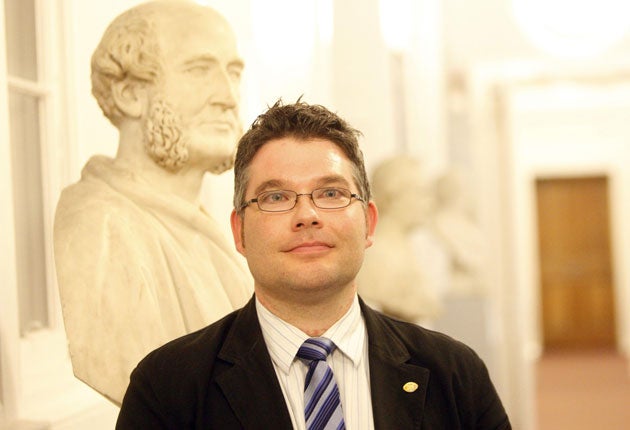Scott Rennie: 'Everyone knows there are other Kirk leaders in this position'
Scott Rennie, Scotland's first gay priest, tells Jonathan Brown how he hopes his ordination can inspire others in the church to come out – and how he has only love for his adversaries

The Church of Scotland's first openly gay minister said he hoped that his appointment in the face of bitter opposition from traditionalists would give other gay and lesbian ministers the strength to come out.
After a "hurtful" six-month campaign against him, Scott Rennie said he was relieved and humbled now that it was over and said he felt only "love" towards those that had sought to block him, despite their insistence that homosexuality is a sin. He played down talk of a new schism comparable to the Great Disruption of 1843 which split the Church of Scotland.
The appointment of the 37-year-old minister, who has one child but is now divorced and lives with his male partner, came late on Saturday night after four hours of anguished debate among church leaders in Edinburgh. Dozens of people protested outside the hall and two were held. The Church's ruling body voted by 326 to 267 in support of Mr Rennie, though more than 300 refused to participate in the electronic ballot. The minister told The Independent yesterday that although it had been a testing ordeal he had never considered giving up, after winning the backing of 80 per cent of his future congregation at Queen's Cross in Aberdeen. "Sometimes you have to defend what you believe in," he said.
"It has been pretty difficult most of the time. It has been stressful in terms of having to endure the kind of intrusion in to your private life and very difficult living in limbo, waiting and not knowing whether you are going to your new parish. I am just glad the days of waiting have come to an end."
The former minister of Brechin Cathedral in Angus said there had been times when the language had become heated, and called for urgent reconciliation between the opposing factions. "If nothing else, I hope the General Assembly's decision will strengthen many people who are gay and lesbian in the church," he added. "Everybody knows there are other Kirk leaders and elders in this position but human sexuality has never been traditionally spoken about which is not surprising."
Mr Rennie's appointment was fiercely opposed by traditionalists who claimed that scriptures forbade same-sex relationships. But modernisers, who pointed to the Kirk's tradition of tolerance and forward-thinking particularly in relation to women ministers who have served in Scotland for 40 years, said it was incumbent on the Church to keep to its reforming spirit and change with the times. They claimed the Bible said nothing on gay or lesbian relationships which were now an "essential feature of modern society".
The Assembly sat as a civil court to consider Mr Rennie's case. Today it will consider the wider issues surrounding the ordination of gay men and women, with some fearing that the previous vote could fail to open the door to the universal acceptance of homosexual ministers.
Saturday's decision was welcomed by equal-rights campaigners. Alyson Thomson, of the Equality and Human Rights Commission Scotland, said: "The commission is delighted that the Church has, as Scott Rennie requested, taken an honest look at itself over the issue of sexuality and decided that the values of fairness, equality, dignity and respect are of more worth than those of ignorance and intolerance."
Mr Rennie, who sat on the Kirk's taskforce on human sexuality, said it was time its recommendations were taken up across the church. "The thing that kept me going is that I have always known that Jesus loves me. As a Christian this gives me tremendous strength to face things. I feel only love towards those that have opposed me. I struggle with their view of things but at the same time I am committed to being in the same church as them, which would be weaker without them."
But Rev David Court and Rev Dr William Philip of the Fellowship of Confessing Churches were unmoved in opposition. They said: "We deeply regret the decision of the General Assembly, which has brought great shame on the name of our Lord Jesus Christ and his Church by publicly proclaiming as holy what God, the Bible, and orthodox Christianity all down the ages, and all over the world, unambiguously call sin. This is about far more than just sexuality. The very nature of the Christian gospel is at stake."
Join our commenting forum
Join thought-provoking conversations, follow other Independent readers and see their replies
Comments
Bookmark popover
Removed from bookmarks